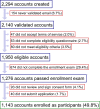Harvard Personal Genome Project: lessons from participatory public research
- PMID: 24713084
- PMCID: PMC3978420
- DOI: 10.1186/gm527
Harvard Personal Genome Project: lessons from participatory public research
Abstract
Background: Since its initiation in 2005, the Harvard Personal Genome Project has enrolled thousands of volunteers interested in publicly sharing their genome, health and trait data. Because these data are highly identifiable, we use an 'open consent' framework that purposefully excludes promises about privacy and requires participants to demonstrate comprehension prior to enrollment.
Discussion: Our model of non-anonymous, public genomes has led us to a highly participatory model of researcher-participant communication and interaction. The participants, who are highly committed volunteers, self-pursue and donate research-relevant datasets, and are actively engaged in conversations with both our staff and other Personal Genome Project participants. We have quantitatively assessed these communications and donations, and report our experiences with returning research-grade whole genome data to participants. We also observe some of the community growth and discussion that has occurred related to our project.
Summary: We find that public non-anonymous data is valuable and leads to a participatory research model, which we encourage others to consider. The implementation of this model is greatly facilitated by web-based tools and methods and participant education. Project results are long-term proactive participant involvement and the growth of a community that benefits both researchers and participants.
Figures


References
-
- Homer N, Szelinger S, Redman M, Duggan D, Temb W, Muehling J, Pearson JV, Stephan DA, Nelson SF, Craig DW. Resolving individuals contributing trace amounts of DNA to highly complex mixtures using high-density SNP genotyping microarrays. PLoS Genet. 2008;4:e1000167. doi: 10.1371/journal.pgen.1000167. - DOI - PMC - PubMed
LinkOut - more resources
Full Text Sources
Other Literature Sources

